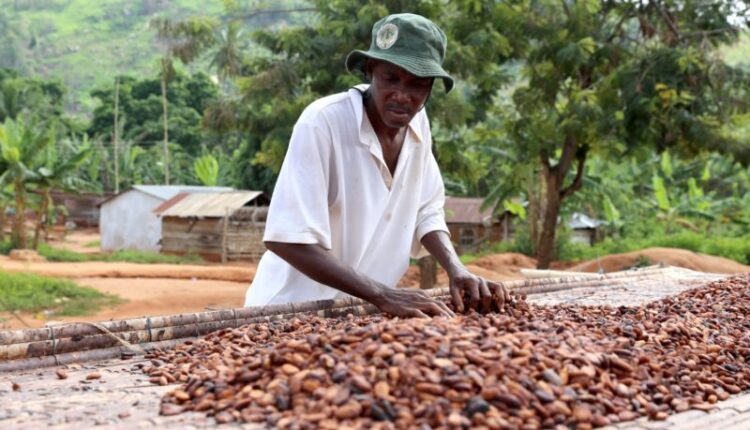Ghana will raise the fixed farmgate price paid to cocoa farmers by up to 50% in an effort to share profits from rising global prices and deter farmers from bean smuggling, a spokesperson at the country’s cocoa marketing board Cocobod said on Wednesday.
Cocoa prices have more than tripled over the last year as disease and adverse weather in Ghana and neighbouring Ivory Coast pushed the global market to a third successive deficit.
The official farmgate price that growers can charge for their beans in Ghana and Ivory Coast, which supply more that 60% of the world’s beans, has yet to reflect the price surge.
Ghana’s state guaranteed cocoa price is currently at 20,943 cedi ($1,574.66) per tone or around 21 cedi per kilogram.
Ivory Coast raised on Tuesday its farmgate price to 1,500 CFA francs ($2.47, or around 33 cedi) per kg for the April-to-September mid crop of the 2023/24 season, up from 1,000 CFA francs last season.
Fiifi Boafo, the head of public affairs at Cocobod, said the new price could be announced as soon as this week but declined to comment further.
A cocoa exporter who asked not to be named said the Minister of Food and Agriculture would meet cocoa sector stakeholders Wednesday afternoon.
“This is a mid-term price and it has nothing to do with next year’s price,” the exporter said.
A source familiar with Cocobod’s thinking said Ghana was aiming to “neutralise” the impact of Ivory Coast’s price hike, given its potential impact on smuggling.
Contacted by Reuters on Wednesday, several of Ghana’s licensed cocoa buyers welcomed the proposed increment as long overdue but said it will increase their cost of operations.
Cocoa production in Ghana, the world’s number two producer, has suffered multiple challenges over the past four years, with output expected to be almost 40% below target in the 2023/24 season due to strong winds, scant rain, smuggling and disease.
Cocobod said it lost about 150,000 tonnes of cocoa beans to smuggling and illegal gold mining known locally as galamsey in the 2022/23 season. It now expects even greater losses this season as rising global cocoa prices create a greater incentive.
The regulator said cocoa swollen shoot virus, which causes yields to drop and kills cocoa trees, wiped off about 590,000 hectares of farmland between 2018 and February 2024.
- Major Ghana Cocoa Region 81% Infected with Bean Disease - July 22, 2024
- Ghana to Delay More Cocoa Deliveries as Supply Crisis Worsens - June 12, 2024
- Cocoa Production Helping Mitigate Climate Change Impact - June 10, 2024
